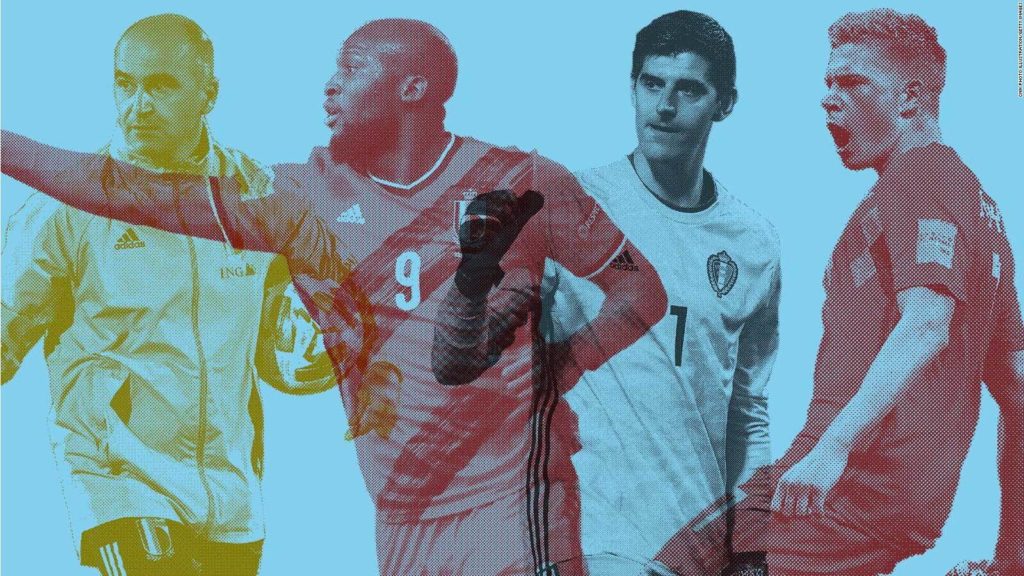It’s one of the greatest achievements in the world of sport: just how on earth did one of the smaller countries assemble the top-ranked team in the most popular game on the planet?
Belgium, a country of roughly 11 million people, wedged between France and Germany in Western Europe and dwarfed by the land mass and population size of those neighbors, first made it to the top of the FIFA rankings in 2015 and has remained firmly on the perch ever since 2018.
In the next 18 months, Belgium is hoping for a major trophy to validate their dominance on the world stage, but even without a title run at the European Championship or the 2022 World Cup, their team of international superstars must still be the envy of football administrators everywhere. And the Red Devils aren’t planning on going anywhere.
The journey began from the pit of despair, Belgium’s joy of co-hosting the 2000 European Championship ended in humiliation as they were bundled out in the group stage of the competition. Just nine days after thousands of white balloons had been released in celebration to kick off the tournament at the King Baudouin Stadium, the bubble had been emphatically burst inside the same arena.
A sun-dappled evening in Brussels finished in the gloom of a 2-0 defeat by Turkey, two goals from Hakan Sükür — the first of which will have given goalkeeper Filip de Wilde nightmares — compelled senior figures in the Belgian Football Association to conduct a root and branch review of their entire football strategy.
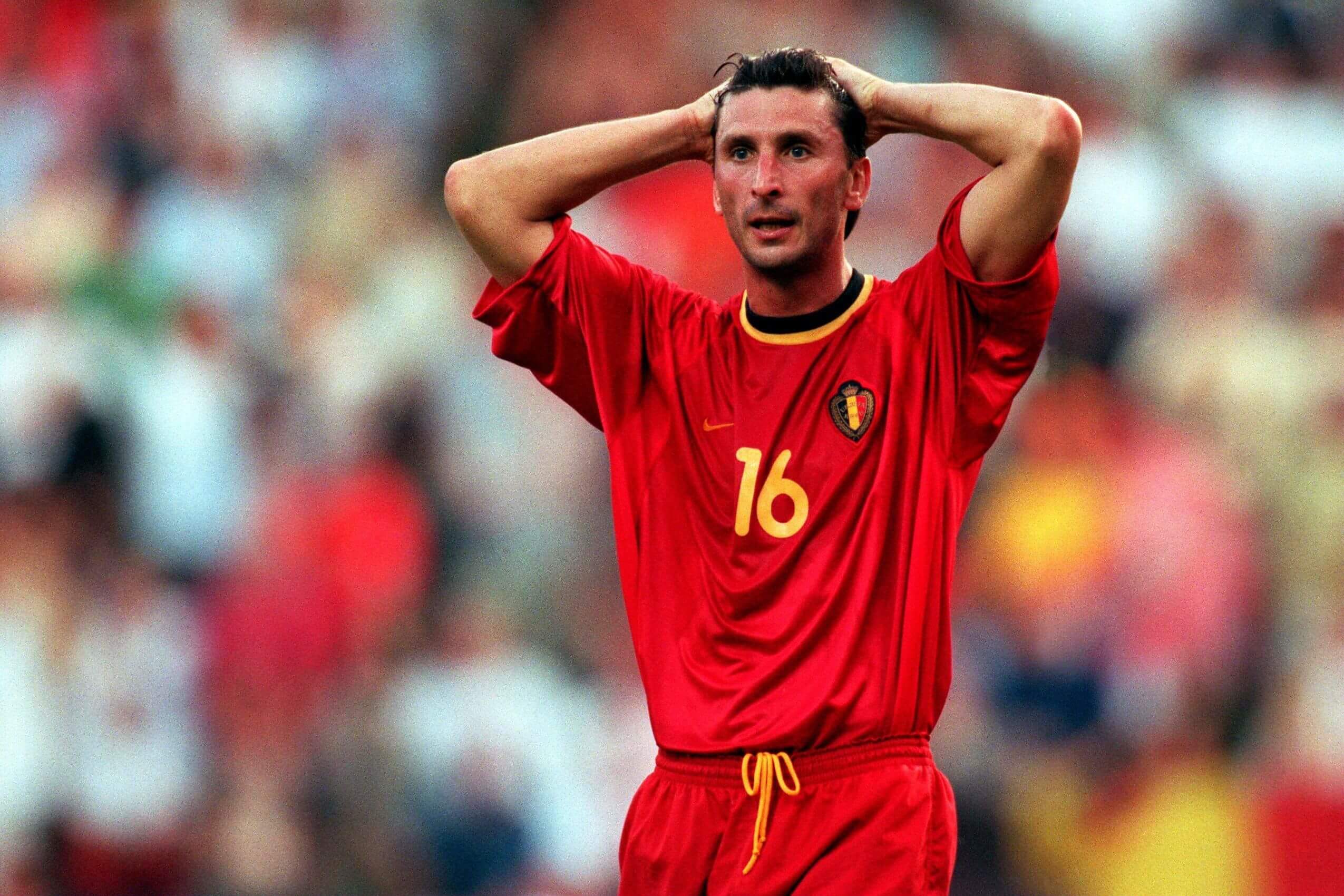
Luc Nilis of Belgium reacts as his country are knocked out of Euro 2000, prompting the Belgian FA into a complete overhaul. (Matthew Ashton/EMPICS/Getty Images)
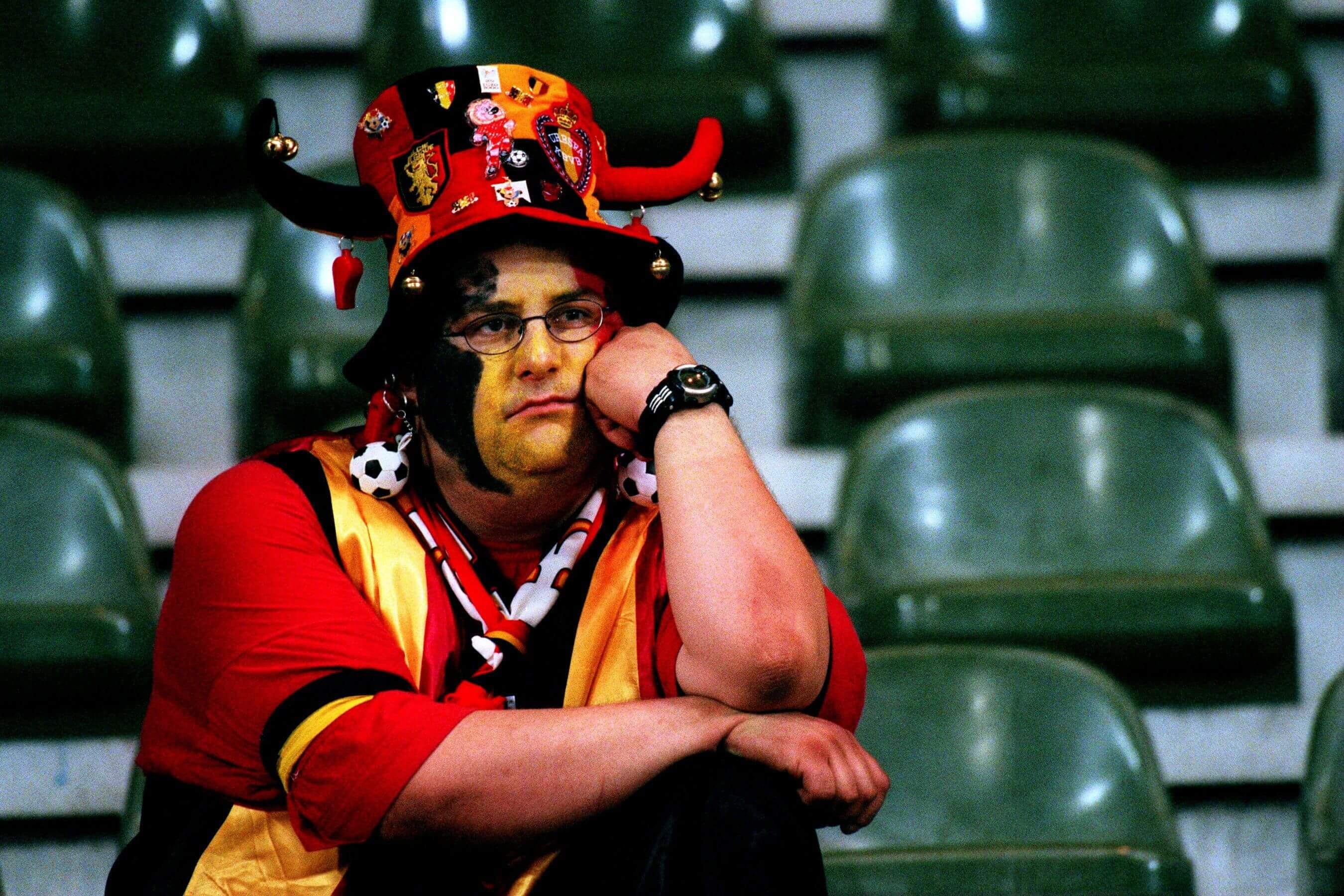
A Belgium fan looks dejected as the national team is knocked out of the group stages at Euro 2000. (Matthew Ashton/EMPICS/Getty Images)
Michel Sablon was the national team’s technical director at the time. He said the organization as tournament hosts was a “big success,” yet the performance on the field was anything but. “It was not good for the players, not good for the clubs, not good for the national team,” he told CNN. “It really was the bottom.”
As it happens, Euro 2000 marked a turning point for two of the teams in action. Germany’s equally disastrous group-stage departure, featuring a rare defeat to England, prompted a thorough review of their football philosophy. It was a rebirth that would yield a World Cup victory 14 years later and Belgium was about to embark on something similar.
Sablon didn’t waste much time, working to identify a new vision for football in their country. “We did it on a Saturday and Sunday, from 7 a.m. to 7 p.m. We started from scratch with a white piece of paper and we developed the whole thing.”
Nothing was left to chance. Sablon explained how they recruited four universities to help research the workload of youth players in either five-a-side or eight-a-side games.
No detail was too small; for example, was 9 o’clock on a Sunday morning really the best time for the kids to play? They analyzed data from 1,500 youth games, enlisted the cooperation of 70 coaches at all levels of the game and made 120 presentations to the clubs that took almost a year.
The traditional, but rigid, 4-4-2 formation was discarded in favor of a more flexible and attacking 4-3-3 line-up, which forced individual players to take more responsibility with the ball.
It was an ambitious plan, but the modest size of Belgium’s football program might have been a help, rather than a hindrance.
With barely two dozen professional clubs in the country, it was easier to get everybody singing from the same song sheet, and as a country without a history of major achievements, there was perhaps more freedom to try and less pressure for an immediate return on investment.
Every club in the country bought into it. Inevitably, there were teething problems, but Sablon believed that if they could hold their nerve, they’d be okay.
“I remember that the first game we did it with was the Under-17 team against France. We lost 7-1 and then the reaction came, of course. But a year later, in the same age category, we dominated France and beat them.”
It took time, he recalled, but in hindsight the only difficult thing was deciding to embark on the journey in the first place.
Around this time, budding young players like Romelu Lukaku, Eden Hazard and Kevin de Bruyne were just eight, 10 and 10 years old respectively. Nobody could have possibly known it then, but they and many other players of their generation would soon be launched on a career trajectory that would change the world game.
FIFA world ranking of the Belgian national team
Source: International Federation of Association Football (FIFA), The Union of European Football Associations (UEFA), Royal Belgian Football Association (RBFA), Transfermarkt
Romelu Lukaku is one of the most powerful forwards on the planet, a deadly finisher who has just helped Inter Milan to the Serie A title in Italy.
Lukaku has never been short on confidence, or the hunger and desire to succeed. It says a lot about his self-belief that he knew, as a 16-year-old, that he was good enough to play in the Belgian national team. It might also say something about the strength of the team at that time.
“I knew I had the whole package,” he told CNN Sport, “I thought to myself that I was different than all the other players they had up front.”
Lukaku made his international debut when he was 17 and is now his country’s record goalscorer. Back then, he was also playing with and against the future stars of the national team: “We knew that at one point, we would take over.”
The Belgian team now enjoys an air of familiarity that would be the envy of many club sides — the players go way back.
Lukaku explains how he has known many of his teammates since he was 11 or 12 years old, and they have often reminisced about the old days when they’re together on international duty.
“We used to sit all together at one table and debate who had the best youth team, who was scoring the most goals, the tournaments we used to attend. It was cool.”
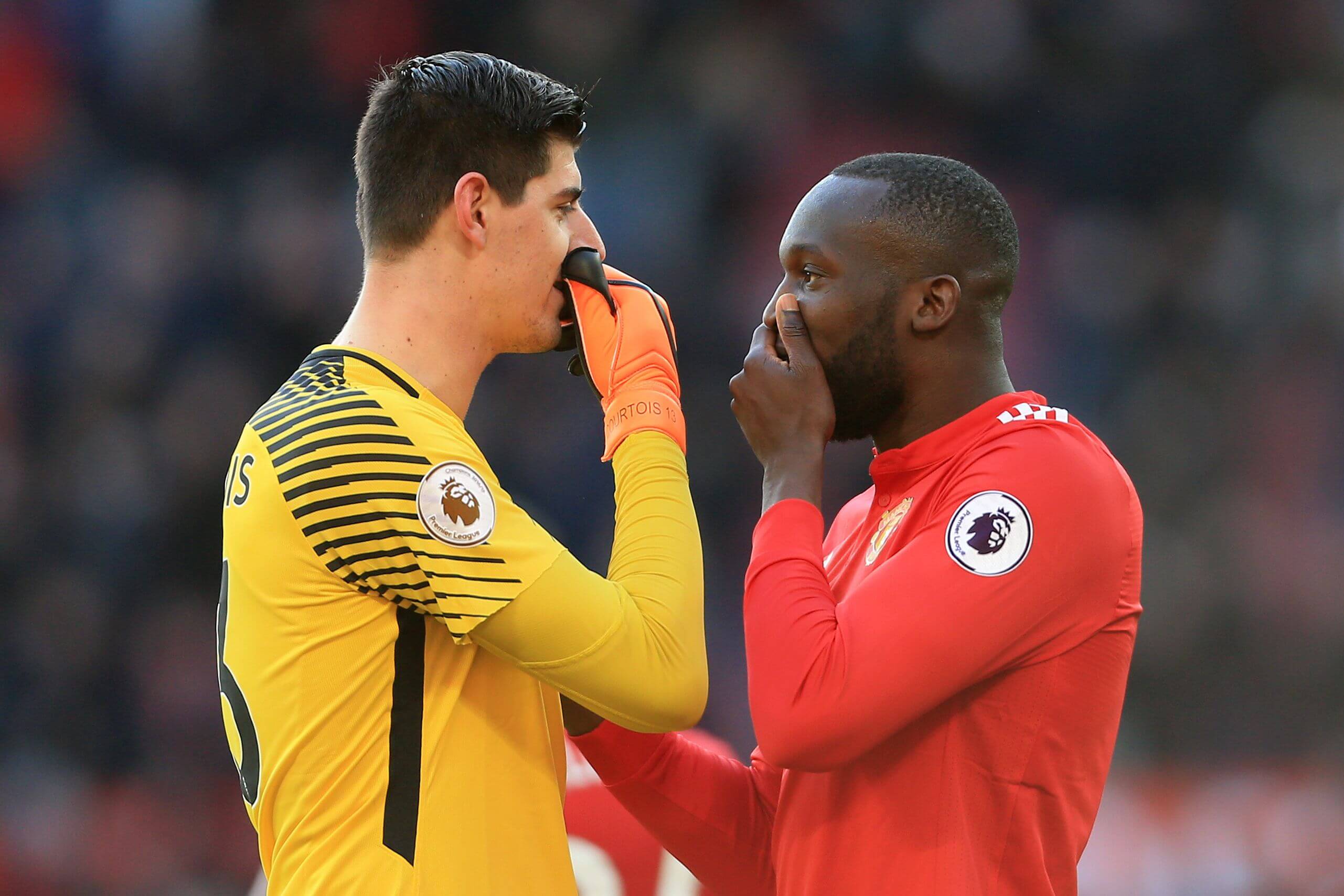
Thibaut Courtois and Romelu Lukaku have been playing against each other since they were young, creating a close bond when they’re together for the national team. (Simon Stacpoole/Offside/Getty Images)
“We know each other since a long time,” said goalkeeper Thibaut Courtois, telling CNN Sport: “For example, I played against Lukaku when we were 12, 13 years old. So that’s like half my lifetime. When we come together, we are a group of friends.
“I remember going to our first World Cup in Brazil, people said, ‘How will the players behave after one month being together? Will there be fights? Will there be problems between them?’ And it wasn’t, because we know each other very well. We are a group of friends. We go play golf together. We play cards together. We play PlayStation together.”
“We know each other through and through,” says Lukaku. “It’s easier when you play in a group and you’ve known almost everybody for many, many years.”
A core group of Belgium’s current squad is highly experienced; nine of them have played 80 or more games for their country, four have earned more than 100 caps and two — Lukaku and De Bruyne — are among the top 10 most valuable players in the world.
Coach Roberto Martínez notes that it is highly unusual for any national team to have so much experience across every position. Speaking in March, he told CNN, “In the last 52 games that I’ve been in charge, we’ve got an average of three goals per game … there’s a real continuity that you don’t get in international football.”
Estimated market value of players
Players with the highest average market value over the past 10 years
Squad value
Tap circle to see player value
Rollover to see player value
Year:
Note: Values are not transfer fees paid; they are estimations of player demand at any time, accounting for salaries, transfers, age, performance, league and other factors. €1 = $1.22
Source: Transfermarkt
When Belgium takes to the field in this summer’s European Championships and next year’s World Cup in Qatar, they will be living proof of the benefits of diversity and inclusiveness. At a time in world history when racism, xenophobia and intolerance are on the rise, Belgium has shown the possibilities when cultural and religious differences are embraced.
“A lot of players have Congolese roots,” says Lukaku, whose father Roger played for what was then Zaire, now the Democratic Republic of the Congo. “Some players have Spanish or Moroccan roots. It shows it doesn’t matter what race you have, as long as you work together properly, everything can be OK.”
“We are a strange country,” noted Courtois. “We have the Dutch part, the French part and the German part. Obviously, it’s not easy being one nation together, but I think Belgium has this beautiful sight.”
In such a small country, three different languages might be a hindrance to progress, but in Belgium it has become a strength.
Roberto Martínez has been the team’s manager since 2016 and he concurs, “I think that diversity is probably the biggest weapon that we have in our dressing room. You always get different views, different solutions. You’re very aware in a young age that in life you can do things in many, many ways; that is the way that you face adversity.”
Martínez is Spanish, but he understands the advantages of broadening one’s horizons at an early age. He explains how he spent most of his professional career in Britain before moving to Belgium with his Scottish wife, and he can recognize that one of Belgium’s biggest strengths is that its players have traveled the world and have then brought all that experience home.
“You have to get out of your comfort zone,” says Lukaku. “The players that are here went out of their comfort zone to make a career for themselves. We left and we tested ourselves, we took a risk and that is what football has to be.”
2000 squad*: Share of Belgian national team players at clubs worldwide
2000 squad*: Share of Champions League clubs
2021 squad*: Share of Belgian national team players at clubs worldwide
2021 squad*: Share of Champions League clubs
*The 2000 squad is from a World Cup qualifier in September 2000 and the 2021 squad is for the upcoming Euros.
Note: numbers are rounded, so percentages may not add up to a hundred.
Source: Royal Belgian Football Association, The Union of European Football Associations (UEFA)
“Fifteen, 20 years ago, there was almost no player playing outside Belgium,” observed Courtois, “Now, almost everyone is playing in one of the biggest teams in the world.”
Courtois has won major trophies with both Madrid clubs (Atlético and Real) plus two Premier League titles with Chelsea in England. De Bruyne has become one of the best players in the world at Manchester City, where his trophy count has just reached double digits; Hazard has won domestic league titles in three different countries and the Europa League twice with Chelsea; Lukaku has played for Chelsea, Everton and Manchester United and is now a champion in Italy.
That’s to say nothing of the exploits of defenders Toby Alderweireld (Tottenham), Jan Vertonghen (Benfica) and Thomas Meunier (Borussia Dortmund), midfielders Youri Tielemans (Leicester City) and Eden’s brother Thorgan Hazard (Dortmund) and forwards Dries Mertens (Napoli) and Michy Batshuayi, who played at Crystal Palace last season on loan from Chelsea.
Belgium’s professional football pyramid, where many of these players began their careers, can only support two leagues and 26 teams, but so prodigious is their talent development that many Belgian players could walk into any team in the world and it’s the nature of their upbringing that’s helped make it possible.
“When Marc Wilmots was the coach [from 2012-2016], he spoke in Dutch and partly in French,” Lukaku explains. “Now, with Roberto Martínez, everybody speaks English, but we speak to each other in French and Dutch.”
“There’s not a problem about learning languages at the age of four or five years old,” observes Martínez, “I see kids speaking three and four languages and it’s incredible how that opens up. The Belgian wants to be of service to the group.
“I would say that that’s the biggest strength of the Belgian as a footballer. He will just walk into the dressing room and try to be valuable. It is not a cultural barrier.”
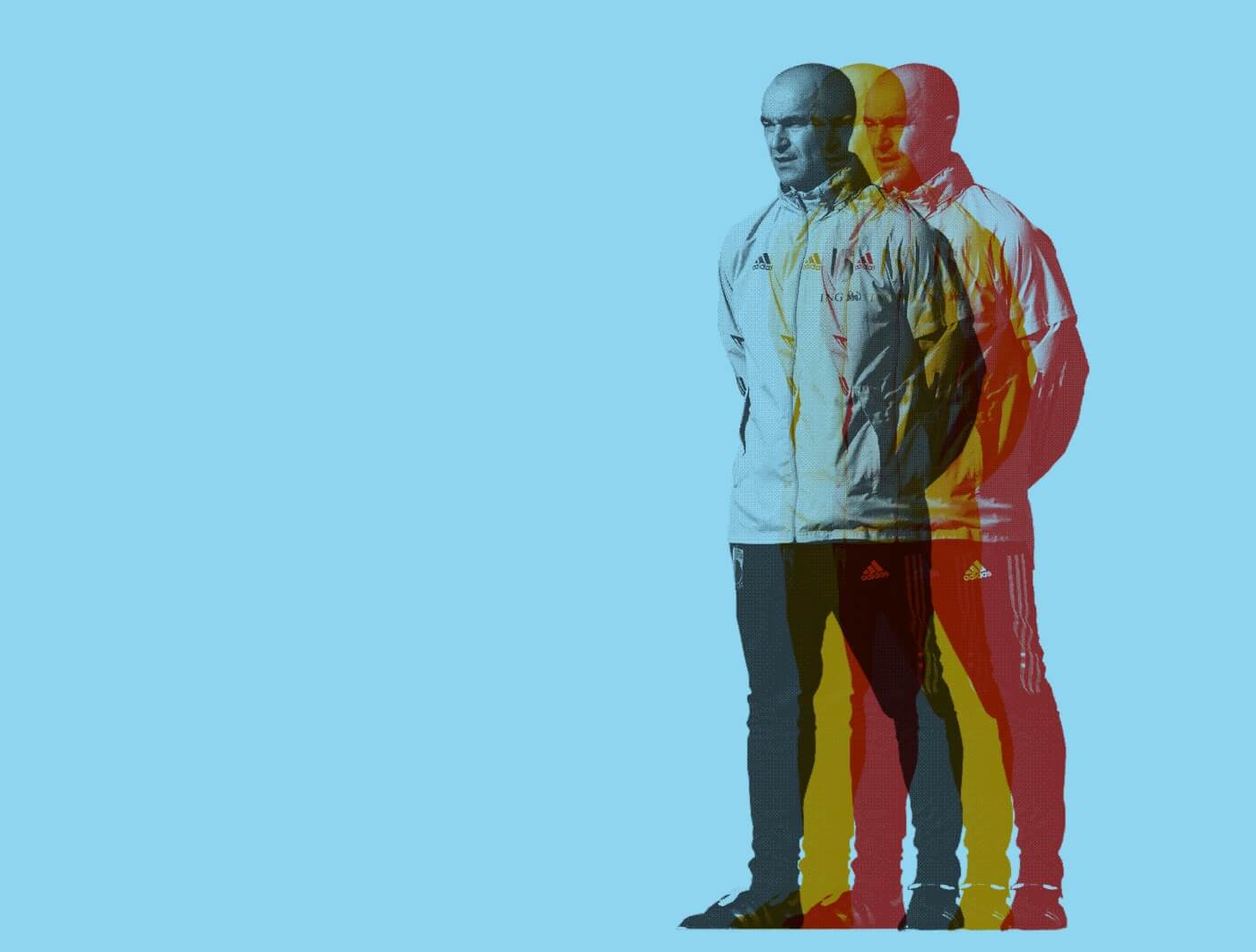
“I think that diversity is probably the biggest weapon that we have in our dressing room. You always get different views, different solutions. You’re very aware in a young age that in life you can do things in many, many ways; that is the way that you face adversity.”
Roberto Martínez, Belgium Manager
When the architects of Belgium’s new vision were laying out their plans, they knew that there would be some short-term pain. What they perhaps didn’t foresee was such a long period in the football wilderness.
Between 2004 and 2007, their FIFA ranking cratered from 16th to 71st in the world, and between 2004 and 2012, they failed to qualify for any major tournament — two World Cups and three European Championships. But the pain has been more than worth it.
Martínez now boasts of having three strong players in every position and a self-sustaining model that everybody has bought into — no less than 23 players are a third of the way through UEFA’s three-year coaching course and, at the end of their playing careers, are expected to return to work in Belgium to help develop the next generation.
In the meantime, they’re happy to show the younger squad players the ropes.
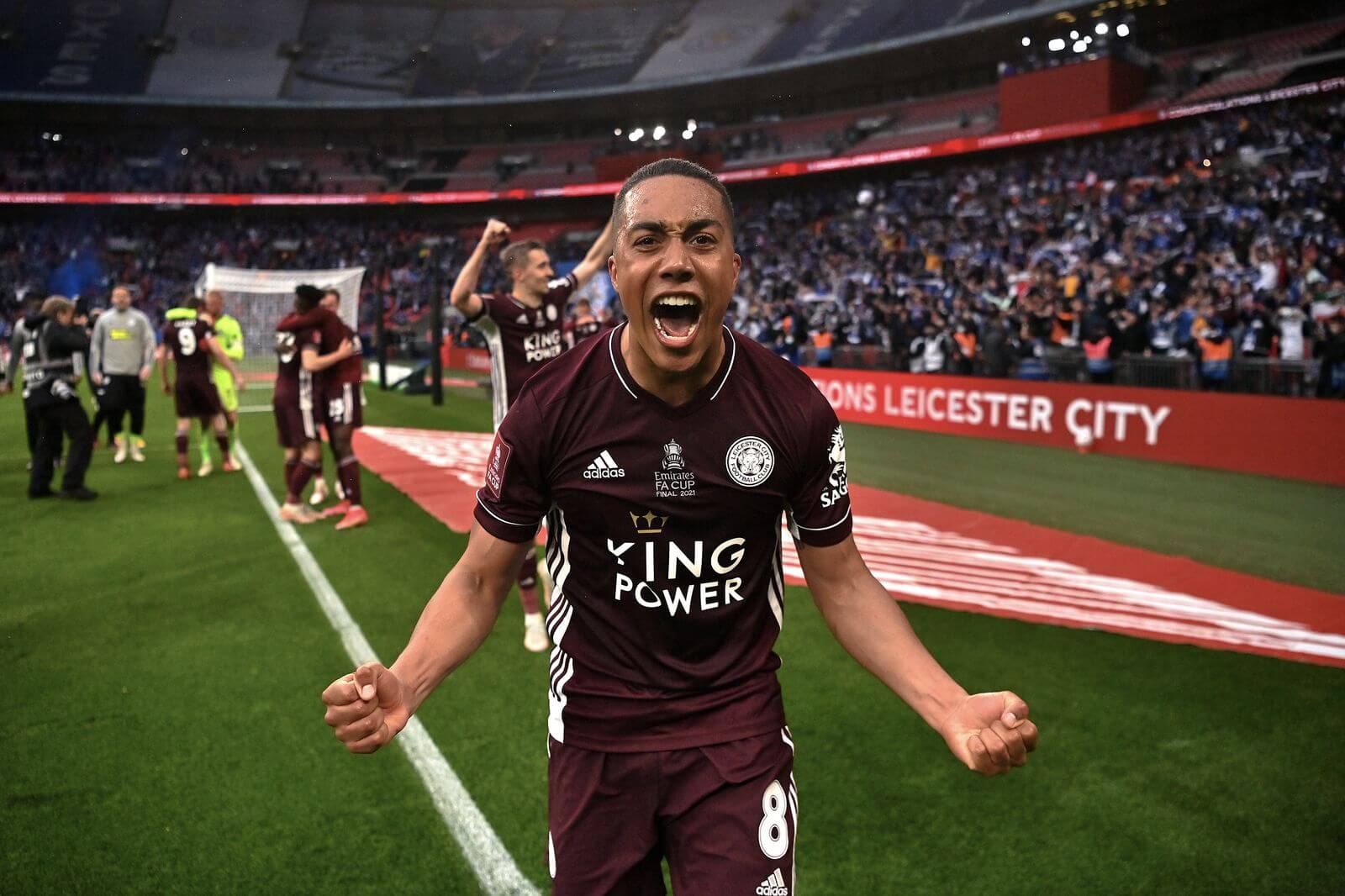
While Belgium’s ‘golden generation’ might be aging, young stars like Youri Tielemans provide plenty of hope for the future. (Michael Regan/The FA/Getty Images)
The 24-year-old Tielemans, who recently scored one of the best goals ever witnessed in the FA Cup final for Leicester City, would be considered one of the younger players, but he’s already richly experienced; he made several appearances at the 2018 World Cup and is approaching 40 caps.
“I’m going to have that mentality to try and win every game that I can and to pass that message onto the new guys,” he told CNN. “Passing on that message to the younger players, hopefully, we will keep the same mentality and build the success.”
“There is an interest of trying to prepare the players of the future,” Martínez explained, emphasizing his optimism about the years ahead. “They care [about] educating the younger group. They are influencing Belgian football now like it’s never been done. I’m sure that this generation will be in Belgian football for many years to come.”
Such a collective attitude speaks to Martínez’s style of coaching, which he describes as ‘shared aspiration.’ “I’ve been part of groups where the leader wants to impose how to do things — I never believed in that. The moment that person turns his back, then you lose control of what that group is working towards.
“Our passion should be a very clear goal, a dream. I always believe that if we share our passion then it’s very easy to commit to the cause and give everything, not just the two hours that we are in training.”
Rise of the Red Devils: How Belgium became the number one team in the world.
While Belgium’s current success story might be unusual, they’re not the first country to experience a ‘golden generation’ of football talent. It’s a scenario that every footballing nation would strive for, but a label that presents a unique pressure to succeed with a trophy.
Spain won three consecutive tournaments between 2008 and 2012 and France won the 1998 World Cup and the Euros in 2000, but Portugal’s team of Rui Costa and Luís Figo failed to deliver. The Iberian nation was able to win the Euros with Cristiano Ronaldo in 2016, but England’s ‘golden generation’ of David Beckham, Steven Gerrard and Michael Owen never even made it to a tournament final.
In their last major tournament — the 2018 World Cup in Russia — Belgium was close. Against Japan in the round of 16, a thrilling last-gasp attack, involving Courtois and De Bruyne, a deceptive run from Lukaku and a sweeping finish from Nacer Chadli completed a thrilling comeback from 2-0 down. “Can you believe it?” cried one commentator.
In the quarterfinals against Brazil, Lukaku was compared to “a tank’” as he dropped his shoulder and charged forward, laying the ball off to De Bruyne for a sensational and decisive goal. A series of impressive saves from Courtois carried Belgium into the semifinals, where they were stopped only by the eventual champion, France.
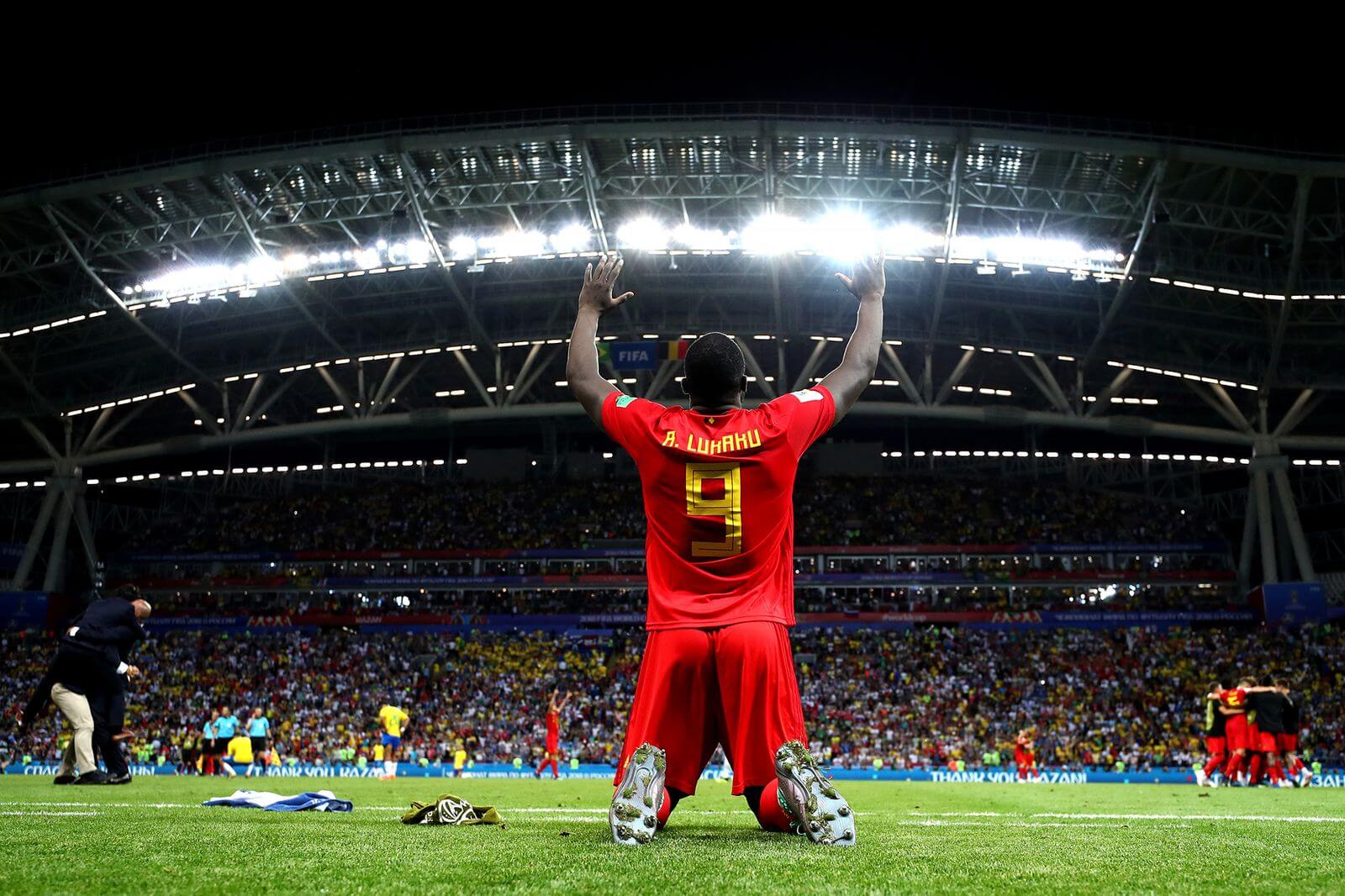
Romelu Lukaku celebrates as Belgium beats Russia to reach the 2018 World Cup semifinals. (Lars Baron/FIFA/Getty Images)
Still, a third-place finish (they beat England in the bronze medal match) was a magnificent achievement and Belgium’s players returned home to Brussels as conquering heroes.
The scenes of them celebrating in front of a packed Grote Markt (Grand Place) in Brussels bore testimony to the joy of the moment and the diversity of the team. But next time, they want to be standing there with champions’ medals around their necks.
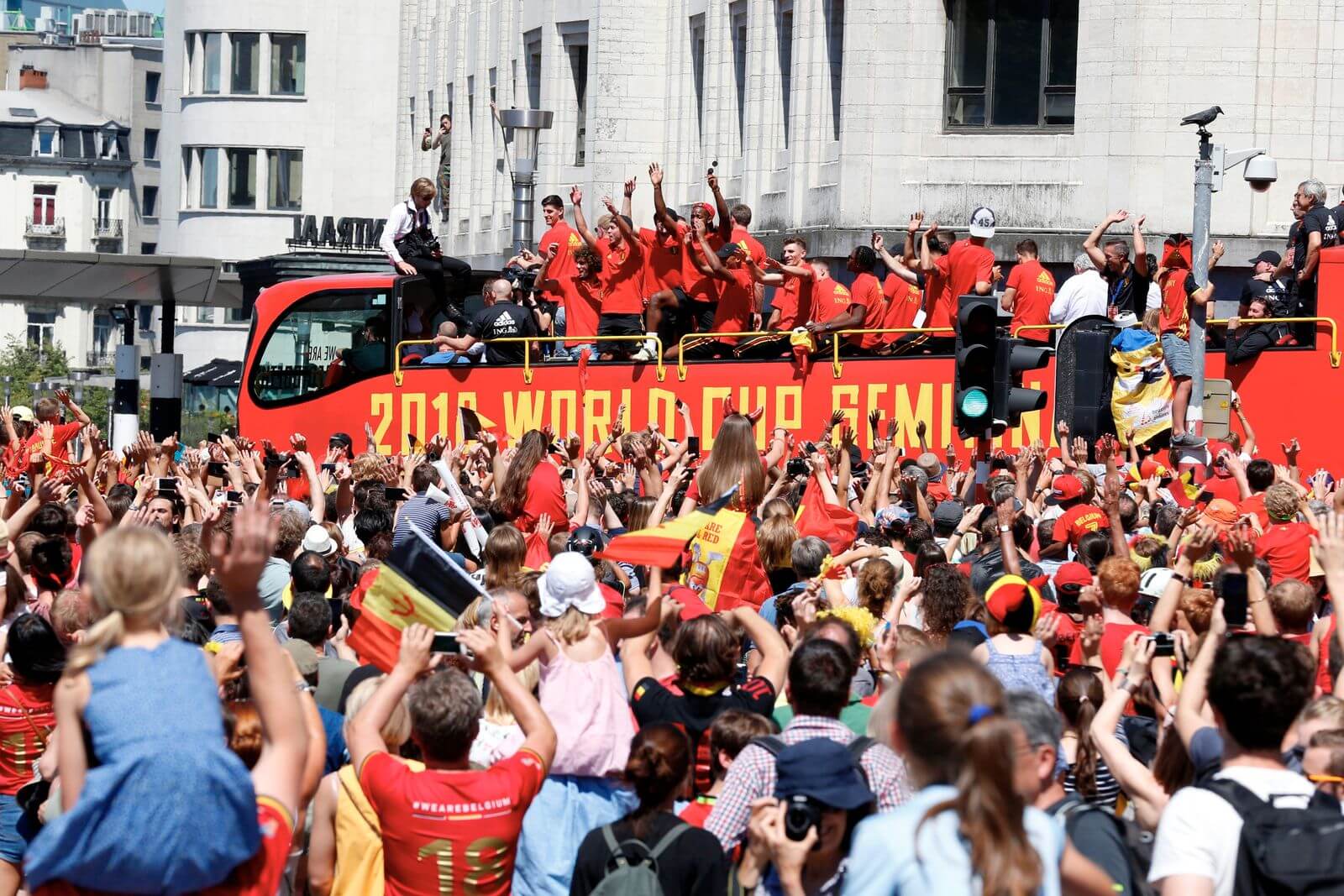
The Belgium squad receives a hero’s welcome at the Grote Markt (Grand Place) in Brussels after returning from the 2018 World Cup with the bronze medal. (Nicolas Maeterlinck/AFP/Getty Images)
Courtois knows how hard it will be again this summer. “Football is football,” he told CNN, “It’s still not predictable. You cannot forget Germany, Spain, Italy, France, Holland, England — even smaller teams can hurt you. But now is hopefully the time to get some silverware, we have a really ambitious team and we will fight for it.”
Courtois is confident that the success will come either now or in the near future.
“If we cannot achieve it, then I’m sure that in the next years there will always come a new generation because of the hard work that there is in Belgium to produce new talent.”
They have all been dreaming of this moment since they first kicked a ball and Lukaku knows it’s there for the taking. “Everything depends on the day,” he said, “Who wants it most? But if we prepare ourselves properly, if we perform, nothing can stop us.”
Published June 11, 2021.
You may also like
-
Super League: UEFA forced to drop disciplinary proceedings against remaining clubs
-
Simone Biles says she ‘should have quit way before Tokyo’
-
Kyrie Irving: NBA star the latest to withhold vaccination status
-
Roger Hunt: English football mourns death of Liverpool striker and World Cup winner
-
‘Every single time I lift the bar, I’m just lifting my country up’: Shiva Karout’s quest for powerlifting glory

